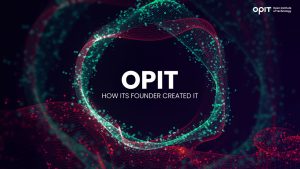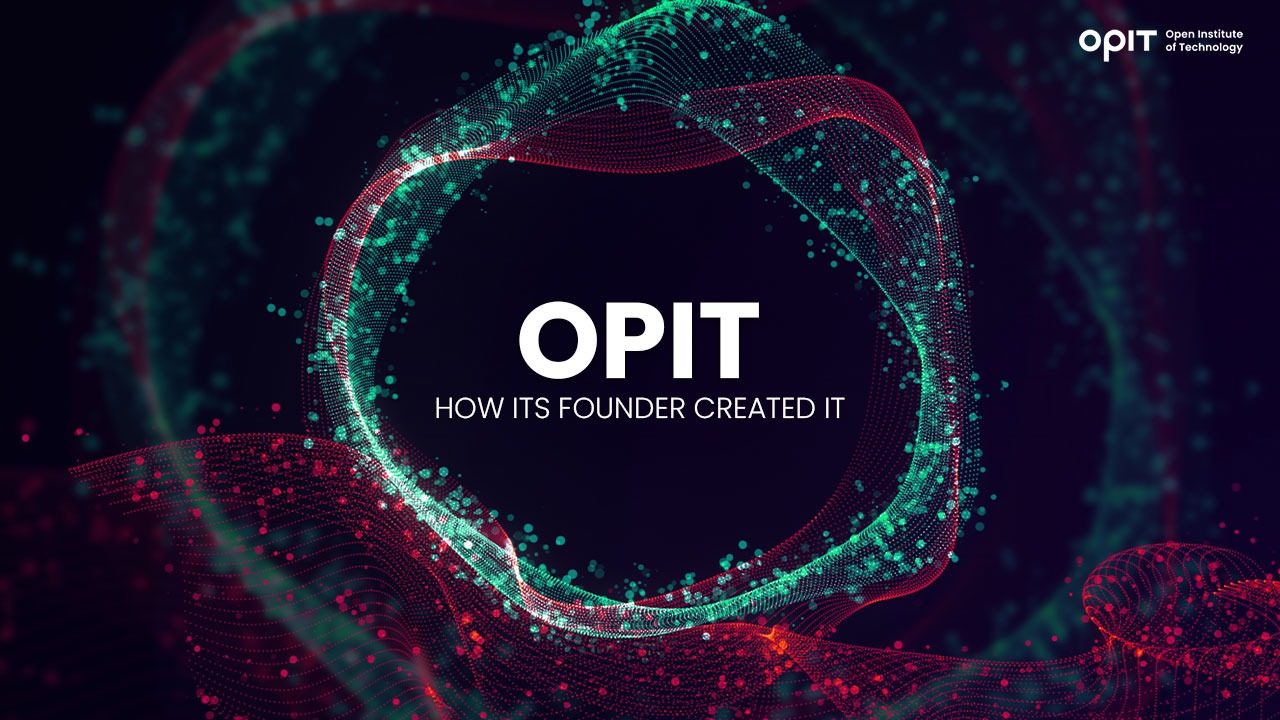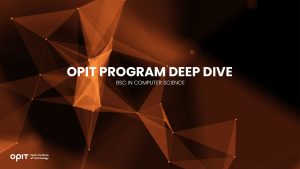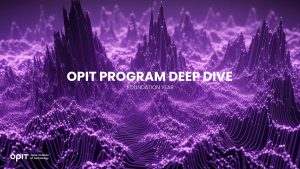

The Open Institute of Technology (OPIT) is a unique institution through and through. From an unparalleled support team that guides you every step of the way to state-of-the-art virtual resources, OPIT redefines online learning. This institution also proves that online education can be as enriching as its traditional counterpart. Better yet, it can outperform it in numerous aspects.
This fact alone begs the question – how did it all begin?
To answer this question, we’ll go straight to the source – the founder of OPIT, Riccardo Ocleppo.
In this article, Riccardo will walk us through his journey of envisioning (and building) OPIT and transforming online education in the process.
The Pre-OPIT Years: Where It All Began
To understand how Riccardo came up with the idea for OPIT, we must travel back to the year 2006. That’s when Riccardo graduated from Politecnico di Torino with a bachelor’s in electronics engineering.
This institution is arguably the most prestigious in Italy (and one of the most reputable in Europe). So, it shouldn’t be surprising that Riccardo chose to continue his education here, pursuing a master’s degree.
He completed the master’s program in 2008 and did so with honors.
Yet, Riccardo couldn’t shake the impression that it was all in vain. In his words, “When I left the university, I had the impression that I could do very little, and I knew very little that could help me in my professional endeavors.”
But Riccardo decided not to sit idly by.
He saw it this way – it might be too late for him, as he was done with his studies. But it’s certainly not too late for future students who deserve a better education. That’s why, only two years later, in 2010, he founded Docsity.
Docsity is an online social learning network with over 20 million registered students. Thanks to this network, over 250 universities worldwide received help in improving their study programs (and finding students).
Docsity also gave Riccardo a chance to fully immerse himself into the education sector for over a decade, finding new ways to reform it from within.
OPIT’s Inception: From Vision to Reality
With the knowledge (and the resources) from Docsity, Riccardo started working on a platform designed to provide the kind of education he wished he had received. The platform in question was, of course, the Open Institute of Technology.
The primary goal of OPIT was to bridge the gap between “what students expect, what companies need, and what higher-level institutions actually deliver in terms of training and education.”
From Riccardo’s experience, this gap was pretty huge. Remember that even with a bachelor’s and a master’s degree in electronics engineering, he felt he had little to offer to companies.
This perceived shortcoming primarily comes from the fact he received a lot of theory at the university but very little practice. And that’s not to mention how outdated the curriculum was, as well as laser-focused on electronics engineering. In other words, bid farewell to “competencies on the most recent technologies and project management methodologies.”
This perspective made him determined to create a holistic educational solution. Or, as Riccardo puts it, “When designing OPIT’s degree programs to address the skills in high demand today, we chose to start from scratch to go beyond the limits of traditional higher education.”
At OPIT, you’ll receive valuable knowledge beyond theory. Essentially, OPIT equips you with everything you need to enter the job market, ready to excel in your field from day one (or day zero, as Riccardo calls it!).
Tailored for Triumph: OPIT’s Unique Programs
Designing any online curriculum is no easy task. However, the computer science field comes with its unique set of challenges. Why?
This field is constantly evolving. That’s what makes it difficult for most traditional higher education institutions to keep up. As Riccardo puts it, “[These institutions] are very slow to adapt to this wave of new technologies and new trends within the educational sector.” Of course, thanks to Docsity, Riccardo speaks from extensive experience, as he’s seen “multiple times how difficult it is to help these institutions update their study curriculum.”
Companies have it no easier.
Riccardo says, “A company needs one to two years to make people that should be trained on today’s technologies and on today’s skills effectively enter the job market and be productive when they enter these companies.”
Again, Riccardo speaks from personal experience. As a founder of a tech company (and a manager in others), he was tasked with creating and managing big tech teams on several occasions. However, despite interviewing hundreds of candidates, he couldn’t find those trained in today’s technologies, not those from 20 years ago.
With this in mind, he designed OPIT’s curriculum to effectively “train the next generation of leaders and managers in the field of computer science.” Many people helped him in this endeavor, chief among them Professor Francesco Profumo, current head of institution at OPIT and former Minister of Education in Italy.
This unique approach makes OPIT’s programs different in terms of how they’ve been conceived and how they’ll be delivered.
Take the Bachelor of Science (BSc) in Modern Computer Science program as an example.
Riccardo says that to be a great programmer, “you cannot just dive into programming itself.” First, you must understand how a computer is built and how its various units operate and communicate. This way, you’ll have no issues debugging a code in the future since you’ll understand the underlying mechanisms.
These underlying systems and foundational skills are precisely what is taught during the first term of the modern computer science program. Afterward, you’ll move toward the latest advancements in computer science, including machine learning, artificial intelligence, data science, cybersecurity, and cloud computing. This way, you’ll have quite a broad perspective on computer science, rarely seen in other educational programs, online or offline.
It also means you won’t have to specialize in a particular field, as you’re forced to do with many other programs. In Riccardo’s opinion, the master’s degree is where you should begin your specialization journey.
OPIT offers as many as four master’s degree programs, but Riccardo focuses on Applied Data Science & AI this time.
In Riccardo’s words, “The whole purpose of this [program] is actually to train people that do not want to pursue a super technical career but actually want to pursue a career at the intersection between the tech and the management of a company.” In other words, individuals who complete this program will acquire all the necessary tech skills. However, they’ll also be able to ensure the tech team is “correctly understood by the management of the company,” thanks to the managerial skills earned during the program.
Of course, this program also covers all the essential theoretical knowledge, from Python to machine learning. But it also has a solid applicative angle, teaching students how to use the most valuable tools available in today’s market. Simply put, you’re training “for what you’ll be doing when you enter your next job.”
Breaking the Mold: What Sets OPIT Apart
The unique curriculum isn’t the only thing that sets OPIT apart from other higher education institutions in the same field. Here’s what Riccardo singles out as OPIT’s most appealing characteristics.
Continuous Assessment
Learning at your own pace can be a double-edged sword. On the one hand, you have all the flexibility and freedom to organize your studies (and life). On the other, you might start procrastinating without a traditional daily commitment of in-classroom learning.
OPIT ensures this unfortunate scenario never happens by doing away with one big final exam you must cram for. Instead, you’ll be continuously assessed throughout the program, allowing you a much better approach to learning and a deeper understanding of the subject matter.
As Riccardo puts it, OPIT will give you “multiple checkpoints,” preventing you from getting “lost” throughout the learning process.
New Learning Resources
According to Riccardo, most of today’s available resources were created for the “oldest wave of education.” That’s why he (and his team) created all OPIT resources and learning materials from scratch, giving you a fresh perspective on the tech world. These resources also come in the form of engaging videos, which are short enough to keep you fully focused yet detailed enough to provide a deep understanding of the topic.
World-Class Professors
Let’s not sugarcoat it – modern resources mean nothing if the professors teaching them still stick to old-school principles and approaches. Luckily, this isn’t the case with OPIT’s faculty.
Every member of this faculty has been carefully selected based on their academic expertise, business experience, and global perspective. These professors aim to “help you learn in a more engaging and interesting way,” as Riccardo puts it.
He also adds that OPIT’s faculty breaks away from the common saying in academics, “Those who can’t do, teach.” In his words, “We didn’t want to have people that can teach because they cannot do,” so that’s the standard he prioritized when bringing people on board.
Future-Proof Your Career
Now that you know the fascinating tale of OPIT’s conception, all that’s left to do is to get in touch with our team of experts and take the first step in future-proofing your career. As you’ve already seen, OPIT will take care of most of the subsequent steps. All you need is a desire to learn and an interest in developing new skills, and success is imminent.
Related posts

Computer Science is fast becoming one of the most valuable fields of study, with high levels of demand and high-salaried career opportunities for successful graduates. If you’re looking for a flexible and rewarding way to hone your computing skills as part of a supportive global community, the BSc in Computer Science at the Open Institute of Technology (OPIT) could be the perfect next step.
Introducing the OPIT BSc in Computer Science
The OPIT BSc in Computer Science is a bachelor’s degree program that provides students with a comprehensive level of both theoretical and practical knowledge of all core areas of computer science. That includes the likes of programming, databases, cloud computing, software development, and artificial intelligence.
Like other programs at OPIT, the Computer Science BSc is delivered exclusively online, with a mixture of recorded and live content for students to engage with. Participants will enjoy the instruction of world-leading lecturers and professors from various fields, including software engineers at major tech brands and esteemed researchers, and will have many paths open to them upon graduation.
Graduates may, for example, seek to push on with their educational journeys, progressing on to a specialized master’s degree at OPIT, like the MSc in Digital Business and Innovation or the MSc in Responsible Artificial Intelligence. Or they could enter the working world in roles like software engineer, data scientist, web developer, app developer, or cybersecurity consultant.
The bullets below outline the key characteristics of this particular course:
- Duration: Three years in total, spread across six terms.
- Content: Core courses for the first four terms, a student-selected specialization for the fifth term, and a capstone project in the final term.
- Focus: Developing detailed theoretical knowledge and practical skills across all core areas of modern computer science.
- Format: Entirely online, with a mixture of live lessons and asynchronous content you can access 24/7 to learn at your own pace.
- Assessment: Progressive assessments over the course of the program, along with a capstone project and dissertation, but no final exams.
What You’ll Learn
Students enrolled in the BSc in Computer Science course at OPIT will enjoy comprehensive instruction in the increasingly diverse sectors that fall under the umbrella of computer science today. That includes a close look at emerging technologies, like AI and machine learning, as well as introductions to the fundamental skills involved in designing and developing pieces of software.
The first four terms are the same for all students. These will include introductions to software engineering, computer security, and cloud computing infrastructure, as well as courses focusing on the core skills that computer scientists invariably need in their careers, like project management, quality assurance, and technical English.
For the fifth term, students will have a choice. They can select five electives from a pool of 27, or select one field to specialize in from a group of five. You may choose to specialize in all things cybersecurity, for example, and learn about emerging cyber threats. Or you could focus more on specific elements of computer science that appeal to your interests and passions, such as game development.
Who It’s For
The BSc in Computer Science program can suit a whole range of prospective applicants and should appeal to anyone with an interest or passion for computing and a desire to pursue a professional career in this field. Whether you’re seeking to enter the world of software development, user experience design, data science, or another related sector, this is the course to consider.
In addition, thanks to OPIT’s engaging, flexible, and exclusively online teaching and learning systems, this course can appeal to people from all over the globe, of different ages, and from different walks of life. It’s equally suitable for recent high school graduates with dreams of making their own apps to seasoned professionals looking to broaden their knowledge or transition to a different career.
The Value of the BSc in Computer Science Course at OPIT
Plenty of universities and higher education establishments around the world offer degrees in computer science, but OPIT’s program stands out for several distinctive reasons.
Firstly, as previously touched upon, all OPIT courses are delivered online. Students have a schedule of live lessons to attend, but can also access recorded content and digital learning resources as and when they choose. This offers an unparalleled level of freedom and flexibility compared to more conventional educational institutions, putting students in the driving seat and letting them learn at their own pace.
OPIT also aims not merely to impart knowledge through lectures and teaching, but to actually help students gain the practical skills they need to take the next logical steps in their education or career. In other words, studying at OPIT isn’t simply about memorizing facts and paragraphs of text; it’s about learning how to apply the knowledge you gain in real-world settings.
OPIT students also enjoy the unique benefits of a global community of like-minded students and world-leading professors. Here, distance is no barrier, and while students and teachers may come from completely different corners of the globe, all are made to feel welcome and heard. Students can reach out to their lecturers when they feel the need for guidance, answers, and advice.
Other benefits of studying with OPIT include:
- Networking opportunities and events, like career fairs, where you can meet and speak with representatives from some of the world’s biggest tech brands
- Consistent support systems from start to finish of your educational journey in the form of mentorships and more
- Helpful tools to expedite your education, like the OPIT AI Copilot, which provides personalized study support
Entry Requirements and Fees
To enroll in the OPIT BSc in Computer Science and take your next steps towards a thrilling and fulfilling career in this field, you’ll need to meet some simple criteria. Unlike other educational institutions, which can impose strict and seemingly unattainable requirements on their applicants, OPIT aims to make tech education more accessible. As a result, aspiring students will require:
- A higher secondary school leaving certificate at EQF Level 4, or equivalent
- B2-level English proficiency, or higher
Naturally, applicants should also have a passion for computer science and a willingness to study, learn, and make the most of the resources, community, and support systems provided by the institute.
In addition, if you happen to have relevant work experience or educational achievements, you may be able to use these to skip certain modules or even entire terms and obtain your degree sooner. OPIT offers a comprehensive credit transfer program, which you can learn more about during the application process.
Regarding fees, OPIT also stands out from the crowd compared to conventional educational institutions, offering affordable rates to make higher tech education more accessible. There are early bird discounts, scholarship opportunities, and even the option to pay either on a term-by-term basis or a one-off up-front fee.

The Open Institute of Technology (OPIT) provides a curated collection of courses for students at every stage of their learning journey, including those who are just starting. For aspiring tech leaders and those who don’t quite feel ready to dive directly into a bachelor’s degree, there’s the OPIT Foundation Program. It’s the perfect starting point to gain core skills, boost confidence, and build a solid base for success.
Introducing the OPIT Foundation Year Program
As the name implies, OPIT’s Foundation Program is about foundation-level knowledge and skills. It’s the only pre-bachelor program in the OPIT lineup, and successful students on this 60-ECTS credit course will obtain a Pre-Tertiary Certificate in Information Technology upon its completion. From there, they can move on to higher levels of learning, like a Bachelor’s in Digital Business or Modern Computer Science.
In other words, the Foundation Program provides a gentle welcome into the world of higher technological education, while also serving as a springboard to help students achieve their long-term goals. By mixing both guided learning and independent study, it also prepares students for the EQF Level 4 experiences and challenges they’ll face once they enroll in a bachelor’s program in IT or a related field.
Here’s a quick breakdown of what the OPIT Foundation Program course involves:
- Duration: Six months, split into two terms, with each term lasting 13 weeks
- Content: Three courses per term, with each one worth 10 ECTS credits, for a total of 60
- Focus: Core skills, like mathematics, English, and introductory-level computing
- Format: Video lectures, independent learning, live sessions, and digital resources (e-books, etc.)
- Assessment: Two to three assessments over the course of the program
What You’ll Learn
The OPIT Foundation Program doesn’t intensely focus on any one particular topic, nor does it thrust onto you the more advanced, complicated aspects of technological education you would find in a bachelor’s or master’s program. Instead, it largely keeps things simple, focusing on the basic building blocks of knowledge and core skills so that students feel comfortable taking the next steps in their studies.
It includes the following courses, spread out across two terms:
- Academic Skills
- Mathematics Literacy I
- Mathematics Literacy II
- Internet and Digital Technology
- Academic Reading, Writing, and Communication
- Introduction to Computer Hardware and Software
Encompassing foundational-level lessons in digital business, computer science, and computer literacy, the Foundation Program produces graduates with a commanding knowledge of common operating systems. Exploring reading and writing, it also helps students master the art of communicating their ideas and responses in clear, academic English.
Who It’s For
The Foundation Year program is for people who are eager to enter the world of technology and eventually pursue a bachelor’s or higher level of education in this field, but feel they need more preparation. It’s for the people who want to work on their core skills and knowledge before progressing to more advanced topics, so that they don’t feel lost or left behind later on.
It can appeal to anyone with a high school-level education and ambitions of pushing themselves further, and to anyone who wants to work in fields like computer science, digital business, and artificial intelligence (AI). You don’t need extensive experience or qualifications to get started (more on that below); just a passion for tech and the motivation to learn.
The Value of the Foundation Program
With technology playing an increasingly integral role in the world today, millions of students want to develop their tech knowledge and skills. The problem is that technology-oriented degree courses can sometimes feel a little too complex or even inaccessible, especially for those who may not have had the most conventional educational journeys in the past.
While so many colleges and universities around the world simply expect students to show up with the relevant skills and knowledge to dive right into degree programs, OPIT understands that some students need a helping hand. That’s where the Foundation Program comes in – it’s the kind of course you won’t find at a typical university, aimed at bridging the gap between high school and higher education.
By progressing through the Foundation Program, students gain not just knowledge, but confidence. The entire course is aimed at eliminating uncertainty and unease. It imbues students with the skills and understanding they need to push onward, to believe in themselves, and to get more value from wherever their education takes them next.
On its own, this course won’t necessarily provide the qualifications you need to move straight into the job market, but it’s a vital stepping stone towards a degree. It also provides numerous other advantages that are unique to the OPIT community:
- Online Learning: Enjoy the benefits of being able to learn at your own pace, from the comfort of home, without the costs and inconveniences associated with relocation, commuting, and so on.
- Strong Support System: OPIT professors regularly check in with students and are on hand around the clock to answer queries and provide guidance.
- Academic Leaders: The OPIT faculty is made up of some of the world’s sharpest minds, including tech company heads, experienced researchers, and even former education ministers.
Entry Requirements and Fees
Unlike OPIT’s other, more advanced courses, the Foundation Program is aimed at beginners, so it does not have particularly strict or complex entry requirements. It’s designed to be as accessible as possible, so that almost anyone can acquire the skills they need to pursue education and a career in technology. The main thing you’ll need is a desire to learn and improve your skills, but applicants should also possess:
- English proficiency at level B2 or higher
- A Secondary School Leaving Certificate, or equivalent
Regarding the fees, OPIT strives to lower the financial barrier of education that can be such a deterrent in conventional education around the world. The institute’s tuition fees are fairly and competitively priced, all-inclusive (without any hidden charges to worry about), and accessible for those working with different budgets.
Given that all resources and instruction are provided online, you can also save a lot of money on relocation and living costs when you study with OPIT. In addition, applicants have the option to pay either up front, with a 10% discount on the total, or on a per-term basis, allowing you to stretch the cost out over a longer period to ease the financial burden.
Have questions?
Visit our FAQ page or get in touch with us!
Write us at +39 335 576 0263
Get in touch at hello@opit.com
Talk to one of our Study Advisors
We are international
We can speak in:


